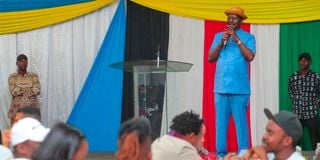Raila Odinga summons Azimio allied governors, deputies for meeting on what next after August polls

Raila Odinga during a lunch with Azimio leaders after the swearing in of Mombasa Governor Abdulswamad Nassir in this photo taken on September 15, 2022. Raila has summoned all Azimio allied governors and their deputies for a meeting to map way foward after August polls.
Opposition leader Raila Odinga has invited all the 26 governors and their deputies from his Azimio la Umoja coalition for a two-day meeting in Naivasha to discuss the way forward after the August election defeat.
The county bosses are expected to check in at the Great Rift Valley Lodge in Naivasha Thursday evening ahead of the intense talks on Friday - the first such meeting with the coalition leadership since the August 9 elections.
According to the programme, Mr Odinga will have informal consultations with the governors this evening after dinner ahead of Friday’s day long meeting.
The meeting will also be addressed by Wiper party leader Kalonzo Musyoka and Narc Kenya leader Martha Karua, who was Mr Odinga’s running mate in the presidential elections.
The invitation letters dated November 17th and signed by Mr Odinga’s Chief of Staff Andrew Mondo, say the agenda of the meeting will be circulated upon arrival but the deliberations will center on the future of the coalition.
The Nation established that the conference is geared towards sealing emerging cracks within the coalition where some Azimio governors have openly expressed their willingness to work with President William Ruto.
Sources disclosed that even though Mr Odinga’s coalition has a majority of elected governors, several of them have been approached by President Ruto’s Kenya Kwanza coalition and enticed to switch loyalties.
Also read: Why Kakamega is running away from Raila
"Several governors have announced they will cooperate with President Ruto and his government for the sake of development in their respective counties. If such an exodus towards Kenya Kwanza is not checked, in another six months, Azimio will be a shell of what it was before August,’’ said a source who requested he is not named.
This dalliance with Kenya Kwanza by Azimio governors is seen technically as defection and switching of political loyalties that are weakening the Opposition camp.
Abdulkarim Zein Abubakar, a former member of the East African Legislative Assembly (EALA) who consults on governance issues and political scientist Prof Adams Oloo will take the governors through the envisaged future of the coalition. Both are close confidants of Mr Odinga.
Mr Abubakar will preside over a one and half hour session on the possible future scenarios while Prof Oloo will major on how the governors can still stick to Azimio’s transformative agenda in their counties.
Kitui Governor Dr Julius Malombe and his Homabay counterpart Gladys Wanga are the only two attendees listed to address the conference where they will give county status reports on behalf of their colleagues.
Mr Odinga and his Azimio coalition partners last met the governors on August 17th alongside other elected leaders at the Kenyatta Convention Conference Centre (KICC), a day after the Independent Electoral and Boundaries Commission (IEBC) declared Dr Ruto as the President Elect.
Today’s meeting comes in the backdrop of plans by President Ruto to secure an absolute majority in the National Assembly, by wooing Azimio MPs to join his coalition, which may guarantee him an easy time passing key legislations, including those on changing the constitution.
Currently, President Ruto has 179 MPs against Mr Odinga’s 157.
Exit clause
But having won over 10 of the 12 independent MPs, and the coming alive of an exit clause in the Odinga-led Azimio, key Kenya Kwanza strategists now see the possibility of bridging the 44-member gap to a two-thirds (233 of the 349 MPs) majority.
A two-thirds majority gives the president and his allies powers to approve or reject proposals with constitutional changes, as well as approving or rejecting a referendum.
The importance of an absolute majority was demonstrated in the previous administration of President Kenyatta which pushed through both Houses of Parliament a Bill to amend the Constitution to expand the executive under the Building Bridges Initiate (BBI).
The effort was only derailed by the Supreme Court which declared the Bill unconstitutional.





